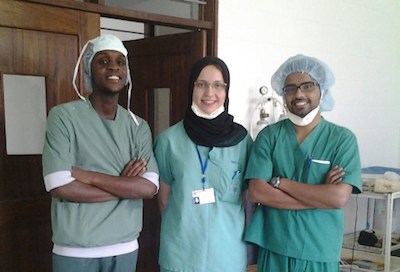Students share Tanzania global health experience
October, 2014
Three medical students discovered the challenges of delivering healthcare in an under-resourced environment when they spent eight weeks in Tanzania on WCMC-Q’s Global Health and Research Experience Program (GHERP).
Second-year medical students Amina Bougaila, Abdulla Elzafarany and Muhammad Shakir spent the summer break at Weill Bugando Medical Center in Mwanza, the second largest city in the country, where they witnessed the difficulties local health workers have trying to care for large numbers of sick and injured people with limited equipment and staff.
The students attended morning report sessions at the hospital each day, shadowed local physicians on ward rounds, performed basic physical examinations and took patient histories. They also had the opportunity to travel beyond the hospital to take part in field work for research projects and to help with vaccination programs for infants under the age of five.
This competitive program is run by WCMC-Q’s Global and Public Health Division, which selects students who have just completed the first year of the medical program and wish to spend a summer at Weill Bugando. Now in its fourth year, the program has typically sent two students to Tanzania each summer, but was expanded this year to three students.
In presenting the program overview, Dr. Sohaila Cheema, Director of GPH, outlined the program and its benefits. She laid emphasis on the collaborative nature of the program, and applauded the efforts of Cornell faculty in New York and Tanzania. She said: “The Global Health Education and Research Program is a once in a lifetime, enriching experience for our students. The students return with strengthened physical examination and communication skills and increased medical knowledge. They learn how to reduce reliance on technology, and develop an appreciation of cultural sensitivity and how it affects healthcare delivery. Additionally, the students also gain an increased understanding of global and public health issues.”

Muhammad Shakir, right, and Amina Bougaila with a colleague
at Weill Bugando Medical Center in Tanzania
In a presentation to fellow students upon their return to WCMC-Q, the students explained how the trip gave them the chance to see first-hand a number of diseases that are rarely encountered in developed countries, such as malaria, tuberculosis, tetanus and schistosomiasis, a condition caused by parasitic worms that is spread by contact with contaminated water. The disease is common in Mwanza owing to the city’s location on the shores of Lake Victoria, which is contaminated with the parasites. The students also saw many patients who had been injured in motorcycle accidents.
For Abdullah, seeing the daily struggles endured by local healthcare providers made a lasting impression. He said: “The eight weeks that I spent in Weill Bugando Medical Centre were very enriching to me as a medical student. Experiencing global health in real life has enlightened me in a way that no amount of lectures about global health could. It has helped me form my own picture of how medicine is practiced in a resource-poor setting and it has also helped me realize what kinds of hardships and obstacles physicians go through as they try to practice in such a setting.”
The students, who were still first-years when they visited Tanzania, finished each working day at 3pm, leaving them time to dedicate to a number of research projects, which included studies of hypertension and neonatal screening for hemoglobinpathies, and proposals for making pediatric ward logs more efficient. They also had the opportunity to spend time sampling the local cuisine, learning some Swahili and to take a short trip to the savannah where they saw some of Tanzania’s impressive wildlife, including lions and elephants.
Mohammad said: “In addition to being an extremely fulfilling and humbling experience, it was also a great learning opportunity as a first-year medical student with the perfect mix of clinical, research, and community service opportunities. I would definitely encourage anyone interested in global health to apply for this program.”
Amina was encouraged by the dedication of healthcare workers and the generosity of the people in Tanzania. She said: “My visit to Tanzania was a true eye-opener about global health issues. It was very enlightening and encouraging to see how some people have very little and they still work so hard and give the best they can to provide healthcare to their people. I truly respect the enthusiasm and the hard work of the Tanzanian doctors and medical students. Despite all the difficulties and challenges they face every day while trying to do their job, they never give up on their patients.
“Tanzania is a beautiful country and its people are very hospitable and generous even with the little they have.”
Dr. Ravinder Mamtani, Associate Dean for Global and Public Health, said: “I am very pleased to hear that our students found their experience so rewarding and that they have so clearly gained a deep understanding of global health issues from their time in Tanzania. Not only have they honed their clinical skills in a taxing and demanding environment, but they have also gained an appreciation of the challenges we face as we strive to expand access to quality healthcare to all corners of the globe.”
